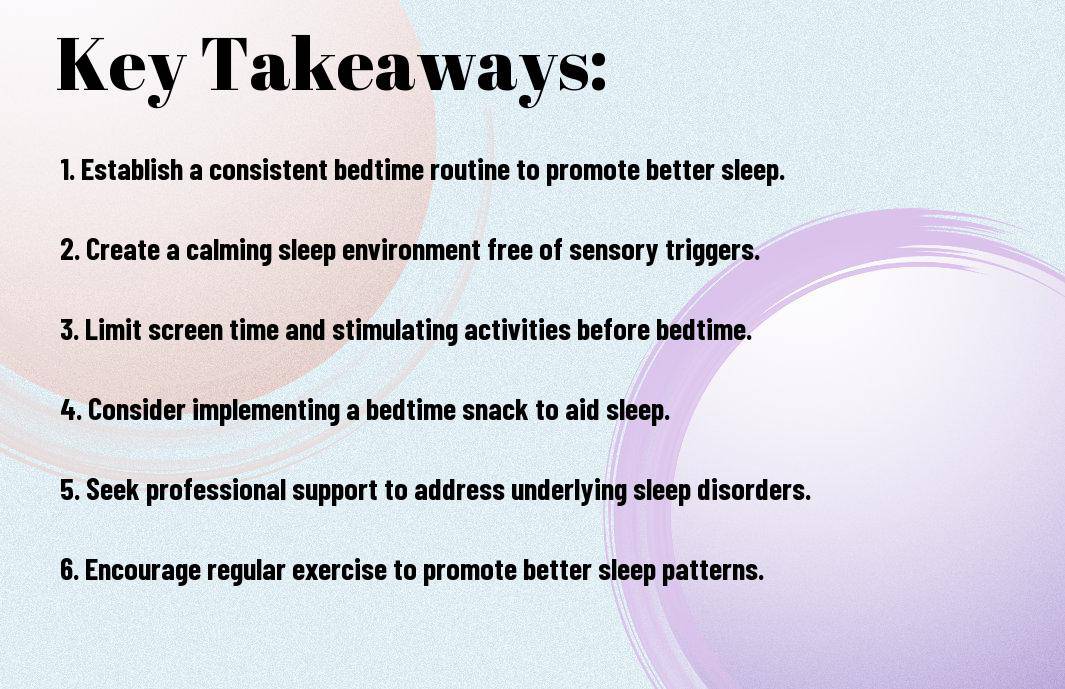Obtaining adequate sleep is vital for overall health and well-being, and this is especially true for children with autism. However, many children with autism struggle with sleep issues, which can have a significant impact on their behaviour and cognitive function. In order to address this pressing concern, it is crucial for parents and caregivers to be aware of effective strategies for tackling sleep issues in children with autism. In a recent study published by the National Center for Biotechnology Information, Recommendations for Identifying Sleep Problems and … provide valuable insights and recommendations for managing sleep problems in children with autism, offering hope for improved sleep quality and overall well-being.
Key Takeaways:
- Understanding the unique sleep challenges in children with autism is crucial for effective management.
- Creating a consistent bedtime routine and providing a sensory-friendly sleep environment can help promote better sleep for children with autism.
- Collaboration with healthcare professionals, such as paediatricians and behavioural therapists, is essential for developing a tailored approach to addressing sleep issues in children with autism.

Identifying Sleep Issues in Children with Autism
When it comes to addressing sleep issues in children with autism, the first step is to identify and understand the specific challenges they may be facing. The Sleep Problems of Children With Autism can vary greatly from typical sleep issues experienced by neurotypical children, so it’s important to recognise the unique signs and symptoms.
Common Sleep Problems
Children with autism often experience difficulty falling asleep, frequent waking during the night, and short or irregular sleep patterns. This can lead to poor quality of sleep and daytime fatigue, impacting both the child and their family members.
Impact on Daily Life
The sleep problems faced by children with autism can have a significant impact on their behaviour, cognition, and overall quality of life. In addition to experiencing irritability and difficulty concentrating, these children may also struggle with social interactions and emotional regulation due to lack of sleep.
The challenges of managing the daytime effects of poor sleep and supporting the development of healthy sleep habits in children with autism can be overwhelming for families and caregivers. It is crucial to address these issues to improve the well-being of both the child and their family.
Causes of Sleep Issues in Autism
Biological Factors
There are several biological factors that may contribute to sleep issues in children with autism. Research suggests that brain abnormalities, such as irregularities in the production of melatonin (the hormone that regulates sleep), may play a role in disrupted sleep patterns. Additionally, individuals with autism often experience sensory sensitivities that can lead to difficulties in settling down for sleep. Anxiety and altered circadian rhythms are also common in individuals with autism, which can further disrupt their sleep.
- Brain abnormalities
- Melatonin production
- Sensory sensitivities
- Anxiety and altered circadian rhythms
Though more research is needed to fully understand the biological factors contributing to sleep issues in autism, it is crucial to acknowledge their influence in developing effective interventions.
Environmental and Behavioural Factors
Environmental and behavioural factors also play a significant role in sleep issues experienced by children with autism. Routine disruptions, limited exposure to natural light, and excessive screen time can all impact sleep quality. Additionally, factors such as inconsistent bedtime routines and lack of sleep hygiene can further exacerbate sleep difficulties in these children.
- Routine disruptions
- Limited exposure to natural light
- Excessive screen time
- Inconsistent bedtime routines
- Lack of sleep hygiene
Recognizing the impact of these environmental and behavioural factors is crucial in developing tailored strategies to improve the sleep quality of children with autism.

Strategies for Improving Sleep
When it comes to addressing sleep issues in children with autism, implementing effective strategies is crucial. One of the key elements in managing sleep problems is understanding the underlying factors that contribute to such issues. The Link Between Autism and Sleep Issues sheds light on the complex relationship between autism spectrum disorder and disrupted sleep patterns, highlighting the need for tailored interventions.
Establishing a Sleep Routine
Establishing a consistent sleep routine is fundamental in promoting better sleep quality for children with autism. This involves creating a structured bedtime schedule, which includes calming activities such as reading or listening to soft music before sleep. It is important to limit screen time and avoid stimulating activities close to bedtime. Consistency and predictability play a crucial role in helping children with autism feel secure and relaxed, contributing to improved sleep patterns.
Intervention and Therapeutic Approaches
For children with autism who struggle with sleep issues, implementing intervention and therapeutic approaches is essential. These may include behavioural interventions, sensory integration therapy, and potential medication options under the guidance of healthcare professionals. It is crucial to seek professional advice to determine the most suitable intervention based on the individual’s specific needs and circumstances.
Interventions may also involve addressing sensory sensitivities and creating a calming bedroom environment to facilitate better sleep. Therapeutic approaches such as cognitive behavioural therapy may be beneficial in addressing anxiety and promoting relaxation. These interventions aim to address the root causes of sleep disturbances and equip children with the necessary tools to achieve restful sleep.
Overcoming Challenges
One of the most significant challenges in tackling sleep issues in children with autism is knowing when to seek professional help. It can be difficult to determine whether a child’s sleep problems are typical for a child with autism or if there is an underlying issue that needs attention. Additionally, finding success stories and encouragement from other parents and professionals can be instrumental in overcoming these challenges.
When to Seek Professional Help
Parents and caregivers should seek professional help if the child’s sleep issues significantly disrupt their daily functioning or if they are experiencing severe behavioural problems as a result. A consultation with a healthcare professional, such as a paediatrician or a sleep specialist, can provide valuable insights and guidance in managing sleep issues in children with autism.
Success Stories and Encouragement
Success stories and encouragement from other parents and professionals can provide hope and inspiration to those facing sleep challenges with their autistic children. Hearing about the strategies and interventions that have been effective for others can offer valuable insights and reassurance. Knowing that others have overcome similar obstacles can provide the motivation to continue seeking solutions and support.
Reading about the experiences of other families and learning how they have tackled sleep issues in children with autism can offer valuable guidance and support. It can also provide a sense of community and solidarity, knowing that you are not alone in facing these challenges.

Tackling Sleep Issues in Children with Autism
In conclusion, addressing sleep issues in children with autism is crucial for their overall well-being and development. Understanding the specific challenges they face, such as sensory sensitivities or communication difficulties, is key to implementing effective strategies. It is important to work closely with healthcare professionals and therapists to create personalised sleep plans that take into account the individual needs of each child. Consistency and routine are also vital in promoting healthy sleep habits, as well as creating a calming and sensory-friendly sleep environment. By tackling sleep issues in children with autism, we can improve their quality of life and support their overall growth and development.
FAQ
Q: What are some common sleep issues in children with autism?
A: Common sleep issues in children with autism include difficulty falling asleep, frequent awakenings during the night, and early morning waking.
Q: Why do children with autism often experience sleep problems?
A: Children with autism may have trouble regulating their body’s internal clock, sensory sensitivities that disrupt sleep, or co-occurring medical conditions that affect sleep.
Q: How can parents help their autistic child establish a bedtime routine?
A: Parents can create a consistent bedtime routine, including calming activities like reading or listening to soft music, to help their child with autism prepare for sleep.
Q: Are there any specific dietary or nutritional recommendations to improve sleep in children with autism?
A: Some children with autism may benefit from a diet low in processed foods and artificial additives, and high in whole foods and nutrients that support sleep, such as magnesium and melatonin.
Q: What role does sensory sensitivity play in sleep issues for children with autism?
A: Sensory sensitivities can make it difficult for children with autism to wind down and relax before bed, as well as causing them to wake easily during the night.
Q: Is medication ever used to help manage sleep issues in children with autism?
A: In some cases, a doctor may prescribe medication to help regulate sleep in children with autism, but this should always be done under medical supervision and as a last resort.
Q: What support is available for parents of autistic children struggling with sleep issues?
A: Parents can seek support from paediatric sleep specialists, occupational therapists, and autism support groups to develop strategies for improving their child’s sleep.







